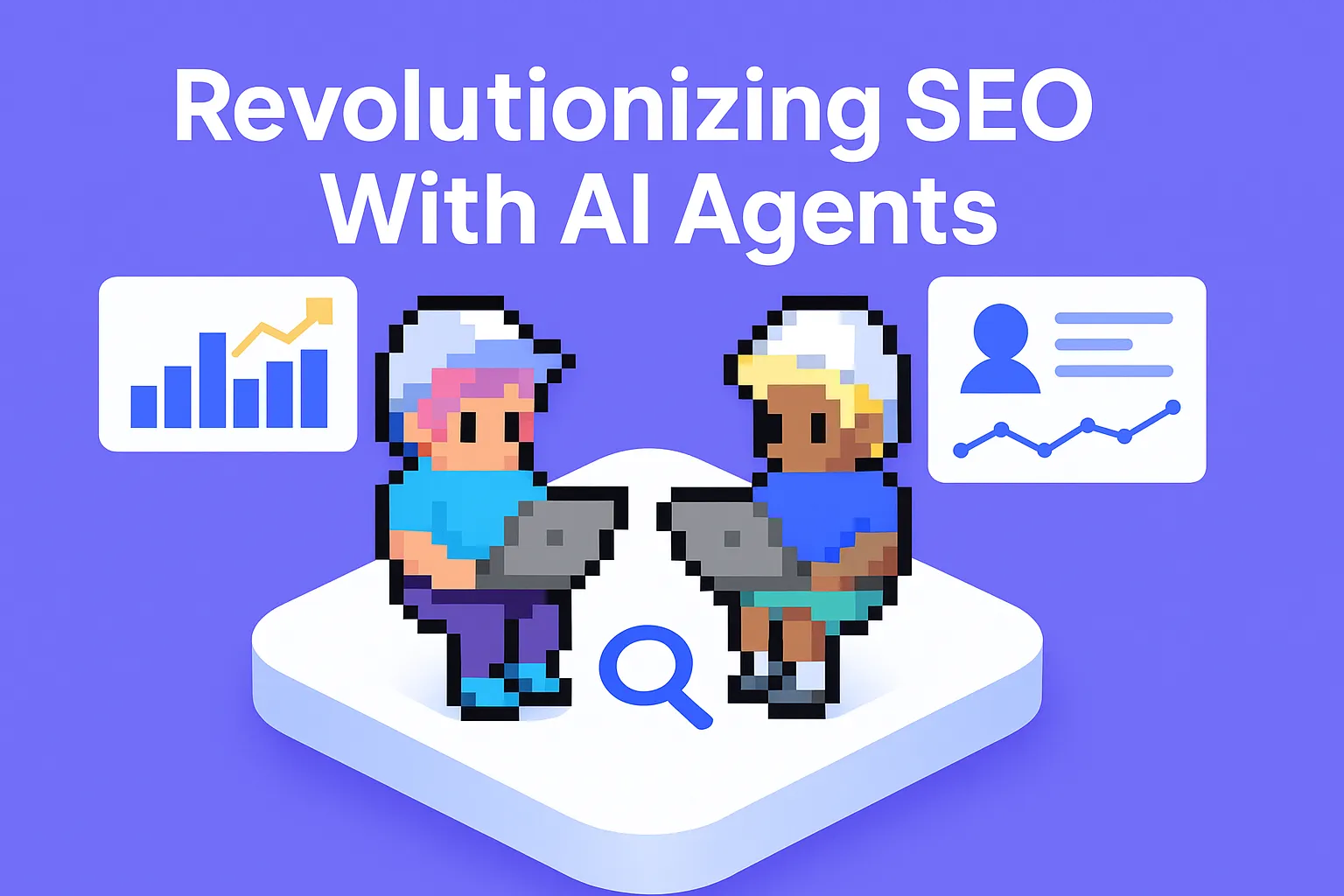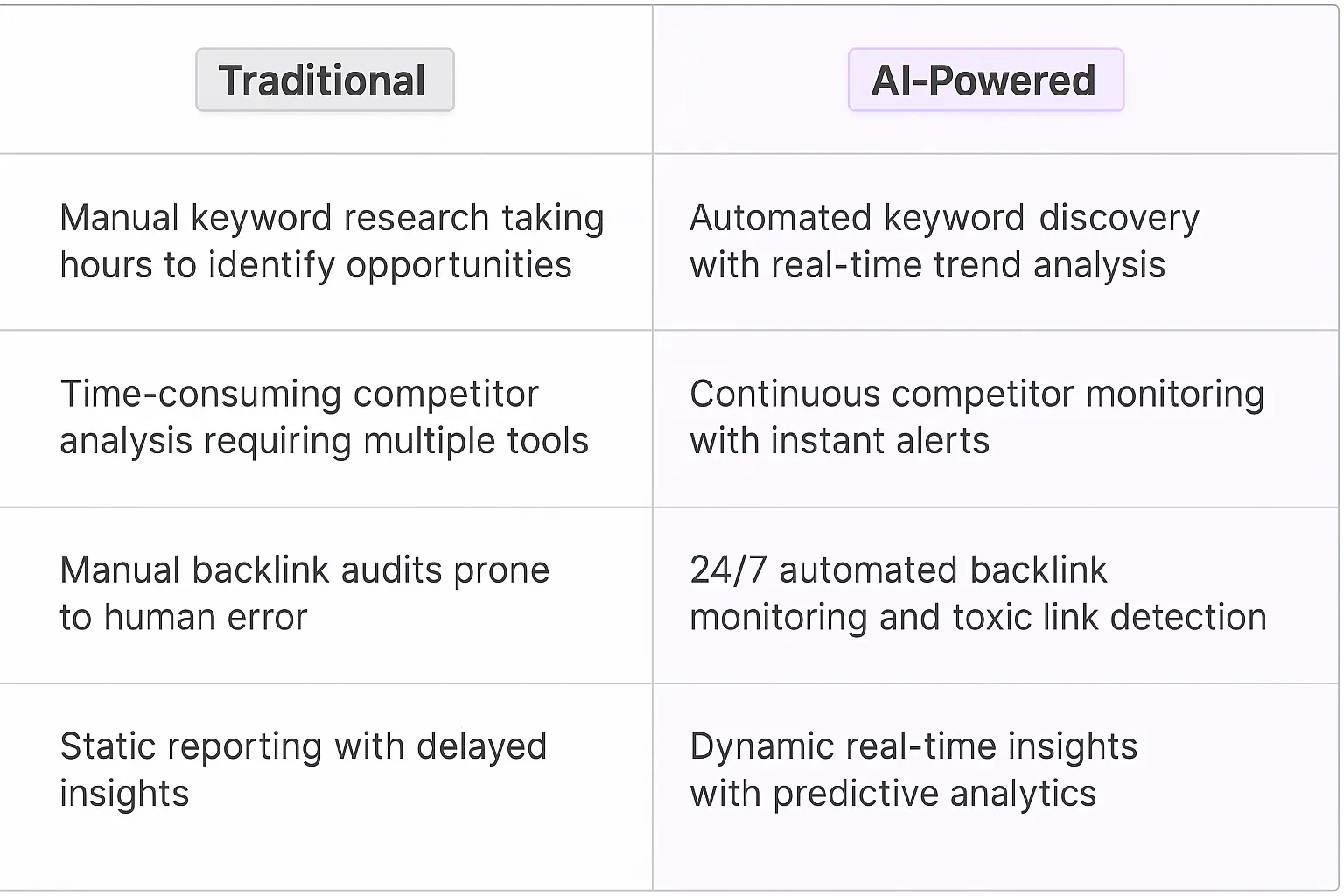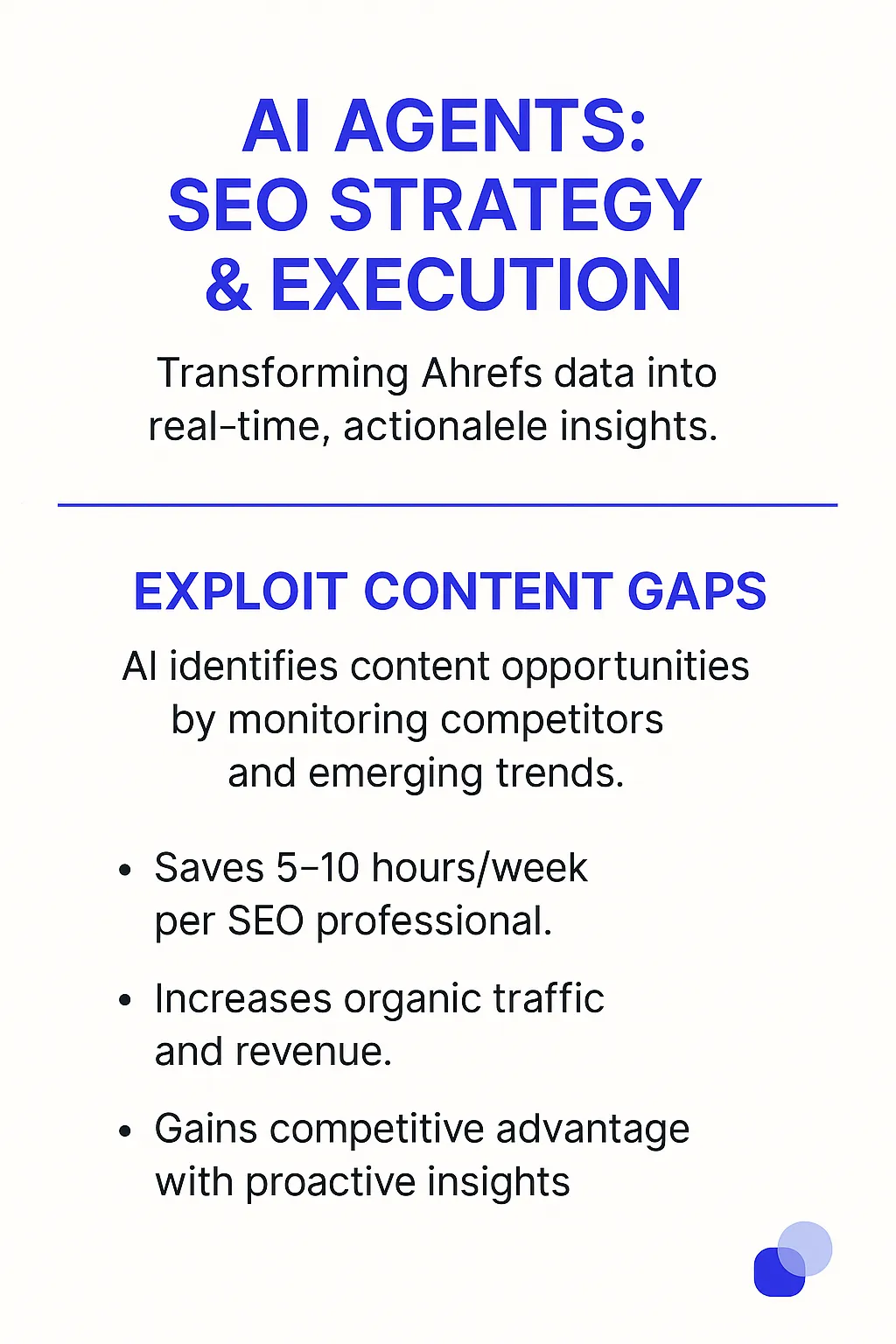Ahrefs AI Agents
Understanding Ahrefs
Ahrefs is not just another SEO tool; it's the Swiss Army knife of digital marketing. Born out of the need for better backlink analysis, Ahrefs has evolved into a comprehensive suite that covers everything from keyword research to content gap analysis. It's the go-to platform for SEO professionals who want to dive deep into the data that drives search rankings.
Ahrefs packs a punch with its feature set. You've got the Site Explorer, which dissects your website's SEO health faster than you can say "backlink profile." The Keywords Explorer is like having a crystal ball for search trends, showing you not just what people are searching for, but why. Content Explorer? It's your secret weapon for finding content gaps and untapped opportunities. And let's not forget about the Rank Tracker, which keeps tabs on your SERP positions with the vigilance of a helicopter parent.
But here's where it gets interesting. Ahrefs isn't content with just giving you data. It's all about actionable insights. The platform doesn't just tell you what's happening; it gives you the tools to understand why it's happening and what to do about it. It's this focus on practical, data-driven strategy that sets Ahrefs apart in a crowded market of SEO tools.

Benefits of AI Agents for Ahrefs
What would have been used before AI Agents?
Before AI agents entered the scene, Ahrefs users were stuck in a loop of manual data crunching and interpretation. They'd spend hours sifting through keyword lists, backlink profiles, and competitor analyses. It was like trying to piece together a 1000-piece puzzle while blindfolded - possible, but painfully slow and inefficient.
SEO specialists and content marketers would rely on their own expertise to connect the dots between various data points. They'd manually track changes in rankings, try to decipher Google's algorithm updates, and make educated guesses about content gaps. It was a high-skill, high-effort process that often led to analysis paralysis or missed opportunities.
What are the benefits of AI Agents?
Enter AI agents, and suddenly we're playing a whole new ballgame. These digital teammates are like having a team of SEO savants working 24/7, processing vast amounts of data at superhuman speeds. They're not just crunching numbers; they're uncovering insights that even seasoned pros might miss.
With AI agents, Ahrefs users can now receive real-time, actionable intelligence. Imagine getting a ping that says, "Hey, your competitor just published a piece of content that's gaining traction fast. Here's a gap in their coverage you can exploit." That's the kind of edge AI agents provide.
These agents can predict trends before they become obvious, helping users stay ahead of the curve. They can simulate the impact of different SEO strategies, allowing for rapid iteration and optimization. It's like having a crystal ball that's powered by data science.
But here's where it gets really interesting: AI agents learn and adapt. They're not static tools; they're evolving partners that get smarter with each interaction. They start to understand the nuances of your specific niche, your content style, and your audience preferences. Over time, they become an extension of your strategic thinking.
The real game-changer is how AI agents democratize high-level SEO expertise. They're lowering the barrier to entry for smaller players who can't afford a team of SEO specialists. At the same time, they're amplifying the capabilities of seasoned pros, allowing them to focus on high-level strategy while the AI handles the grunt work.
In essence, AI agents are turning Ahrefs from a powerful tool into an intelligent ecosystem that actively participates in your SEO success. They're not just giving you a fish; they're teaching you how to fish while simultaneously upgrading the entire fishing industry. That's the kind of exponential value creation that gets me excited about the future of tech.

Potential Use Cases of AI Agents with Ahrefs
Processes
Let's talk about how AI agents can level up your SEO game with Ahrefs. These digital teammates aren't just fancy tools; they're game-changers that can transform how we approach search engine optimization.
First off, think about the tedious process of keyword research. An AI agent could sift through Ahrefs' vast keyword database, identifying golden opportunities that humans might miss. It's like having a tireless intern who never sleeps and has perfect recall of every SEO trend.
Then there's the backlink analysis process. AI agents could continuously monitor your backlink profile, spotting toxic links or identifying high-value link-building opportunities. They'd be like your personal SEO bodyguard, always on alert for threats or chances to boost your site's authority.
Tasks
Now, let's break it down to specific tasks where AI agents could shine:
- Competitor analysis: AI agents could track your competitors' SEO strategies in real-time, giving you a constant feed of actionable insights.
- Content gap analysis: They could cross-reference your content with top-performing pages in your niche, highlighting areas where you're missing out on traffic.
- SERP feature optimization: AI agents could analyze SERPs for your target keywords, suggesting ways to optimize for featured snippets, knowledge panels, and other SERP features.
- Technical SEO audits: They could continuously crawl your site, flagging issues like broken links, slow-loading pages, or mobile optimization problems before they impact your rankings.
- Rank tracking: AI agents could monitor your rankings across thousands of keywords, alerting you to significant changes and suggesting potential causes.
The beauty of these AI agents is their ability to operate 24/7, processing vast amounts of data that would take humans weeks or months to analyze. They're not replacing SEO professionals; they're amplifying their capabilities, allowing them to focus on strategy and creative problem-solving while the AI handles the heavy lifting of data analysis.
As we move forward, the integration of AI agents with tools like Ahrefs will likely become more seamless and powerful. We're talking about a future where SEO strategies are dynamically adjusted in real-time based on AI insights, where content ideas are generated based on emerging trends before they even hit the mainstream, and where link-building opportunities are identified and acted upon with superhuman speed and precision.
The SEO landscape is about to get a lot more interesting, and those who embrace these AI-powered digital teammates will have a significant edge in the increasingly competitive world of search engine rankings.

Industry Use Cases
The versatility of AI agents in Ahrefs makes them valuable across various industries. Let's dive into some meaty, industry-specific use cases that showcase how AI can transform workflows and processes in ways you might not expect.
Think of these AI agents as your digital SEO ninjas, silently working behind the scenes to give you an edge in the cutthroat world of online visibility. They're not just tools; they're like having a team of expert analysts crunching data 24/7, but without the need for coffee breaks or sleep.
From e-commerce to content marketing, these AI-powered features are changing the game in ways that would make even the most seasoned SEO veterans do a double-take. So buckle up, because we're about to explore how these digital teammates are reshaping industries and giving businesses the kind of insights that used to take weeks to compile.
SEO Agencies: Scaling Link Building with Ahrefs AI
Let's talk about how SEO agencies can leverage Ahrefs AI to scale their link building efforts. This isn't just about automating outreach - it's about creating a flywheel for high-quality backlink acquisition.
SEO agencies often hit a ceiling in their link building campaigns. They max out their human capacity to research prospects, craft personalized pitches, and manage follow-ups. Enter Ahrefs AI.
This digital teammate can analyze your client's backlink profile, identify gaps, and generate a list of high-potential link prospects. But here's where it gets interesting: the AI doesn't just stop at prospecting. It can draft customized outreach emails that actually sound human, adapting its tone and pitch based on the target website's content style and previous successful outreach patterns.
The real magic happens when you combine this with Ahrefs' existing data on website metrics. The AI can prioritize outreach based on domain authority, relevance scores, and even the likelihood of a positive response based on historical data. It's like having a seasoned link building strategist working 24/7, but at scale.
But let's push this further. What if the Ahrefs AI could also monitor your competitors' backlink acquisitions in real-time? It could alert you to new opportunities and even suggest content ideas that are likely to attract links in your niche. This creates a constant feed of actionable insights that keep your link building strategy ahead of the curve.
The result? SEO agencies can take on more clients, deliver better results, and focus their human talent on high-level strategy and relationship building. It's not about replacing human expertise - it's about amplifying it to create exponential growth in your link building efforts.
This is just scratching the surface. As the AI learns and improves, we could see it handling complex negotiations, identifying emerging link building trends, and even predicting algorithm changes based on patterns in backlink data. The agencies that embrace this technology early will have a significant competitive advantage in the ever-evolving SEO landscape.
E-commerce: Ahrefs AI as Your Growth Hacking Copilot
Let's dive into how e-commerce businesses can leverage Ahrefs AI to become growth hacking machines. This isn't just about boosting traffic - it's about creating a self-optimizing system for explosive revenue growth.
E-commerce companies often struggle with the sheer complexity of modern digital marketing. They're juggling SEO, content marketing, paid ads, and social media, often without a clear picture of what's actually moving the needle. Ahrefs AI changes the game entirely.
Imagine an AI that doesn't just track your rankings, but proactively identifies untapped keyword opportunities based on your product catalog and market trends. It's constantly analyzing your competitors' content strategies, spotting gaps you can exploit, and even suggesting product bundles based on search patterns.
But here's where it gets really interesting: Ahrefs AI could integrate with your e-commerce platform to correlate SEO efforts directly with revenue. It's not just telling you that you're ranking #1 for a keyword - it's showing you exactly how much money that ranking is putting in your pocket. This level of attribution has been the holy grail of digital marketing for years.
The AI doesn't stop at analysis - it becomes your growth hacking copilot. It could draft product descriptions optimized for both conversion and SEO, generate content ideas that align with current search trends, and even suggest site structure changes to maximize crawlability and user experience.
Think about the implications for scaling. With Ahrefs AI, a small e-commerce team could compete with giants, running sophisticated multi-channel campaigns that would typically require a full marketing department. It's like having a team of SEO experts, content strategists, and data analysts working 24/7, but with the consistency and scalability only AI can provide.
The real power move? Using Ahrefs AI to identify and capitalize on micro-trends before they hit mainstream. By analyzing search data in real-time, the AI could spot emerging product categories or shifts in consumer behavior, allowing you to adjust your inventory and marketing strategy ahead of the curve. This is the kind of agility that creates category-defining e-commerce brands.
We're talking about a fundamental shift in how e-commerce businesses approach growth. It's not just about doing SEO better - it's about creating a self-improving system that turns data into revenue, automatically and at scale. The e-commerce players who embrace this AI-driven approach won't just grow - they'll create entirely new categories and redefine what's possible in online retail.
Considerations and Challenges for Ahrefs AI Agent Implementation
Implementing an Ahrefs AI Agent isn't just about plugging in some cool tech and watching the magic happen. It's a complex dance of technical prowess, operational finesse, and strategic thinking. Let's dive into the nitty-gritty.
Technical Challenges
First up, we're talking about integrating a sophisticated AI system with Ahrefs' robust SEO toolset. This isn't your average API hookup. We're looking at:
- Data synchronization issues: Ensuring real-time updates between Ahrefs' vast database and the AI agent's knowledge base.
- Natural Language Processing (NLP) hurdles: Training the AI to understand and interpret complex SEO queries and industry jargon.
- Scalability concerns: Building an infrastructure that can handle millions of queries without breaking a sweat.
It's like trying to teach a genius toddler to speak fluent SEO while juggling flaming torches. Not impossible, but definitely not for the faint of heart.
Operational Challenges
On the ops side, we're not just flipping a switch and calling it a day. We're looking at:
- User adoption: How do we get SEO pros to trust an AI with their precious keyword research?
- Training and onboarding: Educating users on how to effectively leverage this new digital teammate without overwhelming them.
- Feedback loops: Creating systems to continuously improve the AI based on user interactions and evolving SEO landscapes.
It's a delicate balance of pushing innovation while not alienating your core user base. Think of it as introducing a new star player to a championship team mid-season.
Strategic Considerations
Now, let's zoom out and look at the bigger picture:
- Competitive edge: How does this AI agent position Ahrefs against other SEO tools in the market?
- Pricing strategy: Do we charge a premium for AI-powered features, or bundle them to increase overall platform value?
- Long-term vision: How does this fit into Ahrefs' roadmap for the next 5-10 years?
We're not just building a feature; we're potentially reshaping the entire SEO tools landscape. It's like playing 4D chess while everyone else is still figuring out checkers.
Implementing an Ahrefs AI Agent is a high-stakes game with potentially massive payoffs. It's not just about the tech – it's about vision, execution, and the ability to navigate uncharted waters. For those bold enough to take on the challenge, the rewards could be game-changing.
The Future of SEO: AI-Powered Revolution in Digital Marketing
The integration of AI agents into Ahrefs isn't just an upgrade; it's a paradigm shift. We're moving from a world where SEO tools provide data to one where they actively participate in strategy formulation and execution. This isn't about replacing human expertise; it's about augmenting it to levels previously unimaginable.
The challenges are real - from technical hurdles to user adoption. But the potential payoff is massive. We're looking at a future where SEO strategies are dynamically adjusted in real-time, where content ideas are generated based on emerging trends before they hit mainstream, and where link-building opportunities are identified and acted upon with superhuman speed and precision.
For Ahrefs users, this means staying ahead of the curve in an increasingly competitive digital landscape. For the SEO industry as a whole, it signals a new era where the boundaries between tool and strategist begin to blur. The winners in this new paradigm will be those who can effectively collaborate with these AI agents, leveraging their capabilities to push the boundaries of what's possible in search engine optimization.
As we stand on the brink of this AI-powered revolution in SEO, one thing is clear: the future of digital marketing is not just about having the best tools, but about how intelligently we can wield them. And with AI agents, Ahrefs is giving us a glimpse of that future today.













